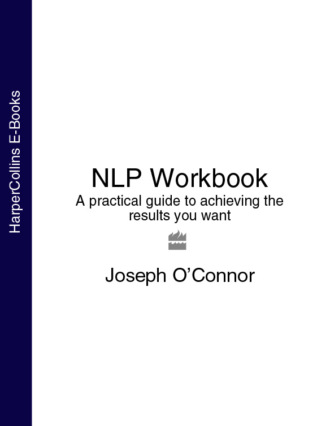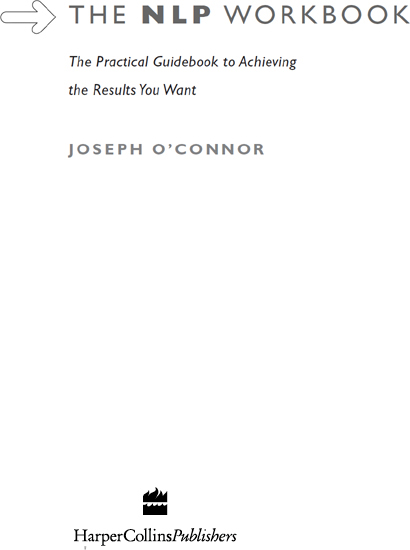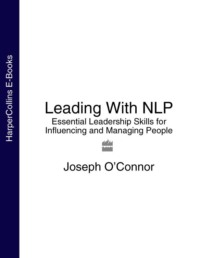
Полная версия
NLP Workbook: A practical guide to achieving the results you want



Cover
Title Page
Acknowledgements
Introduction
Chapter 1 What is NLP?
Chapter 2 Outcomes
Chapter 3 Learning
Chapter 4 Relationship
Chapter 5 The Senses
Chapter 6 Emotional State
Chapter 7 Inside the Mind
Chapter 8 Strategies
Chapter 9 Language
Chapter 10 The Meta Model
Chapter 11 The Milton Model
Chapter 12 Metaphor
Chapter 13 Writing
Chapter 14 Understanding
Chapter 15 Framing
Chapter 16 Putting It All Together
Appendices:
NLP Patterns
The Principal Influences on NLP Development
Bibliography
Glossary
NLP Resources
Training and Consultancy
Index
Keep Reading
About the Author
Also by the Author
Copyright
About the Publisher

First, my thanks to John Grinder and Richard Bandler, who, working together, created NLP in the mid-1970s. Standing on the shoulders of the outstanding therapists and thinkers of the time, they created a new field. Theirs is the greatest contribution. Many others have developed and extended NLP since then – David Gordon, Judith DeLozier, Leslie Cameron Bandler, Steve and Connirae Andreas, Robert Dilts, Tad James and others. I have given acknowledgements in the book wherever I know the ideas or exercises have been developed primarily by any person or group. Some may go unrecognized that should be recognized. If this is so, my apologies, and I welcome feedback to set the record straight.
Once again I would like to thank Carole Tonkinson, my editor at Element, for her great help and support, and also Elizabeth Hutchins for shaping the words into an even better representation of what I was trying to express. All my practitioner students have opened my eyes to new aspects of NLP that have helped to enrich this book. The best students are the best teachers. Finally, as a recovering musician, my thanks to Everclear (wonderful), The Red Hot Chilli Peppers and REM for providing great music to write by.
Joseph O’Connor
October 2000

Welcome to the NLP workbook. This is the most comprehensive guide to Neuro-Linguistic Programming available. It has all the main material to practitioner level as well as many exercises, suggestions and resources that go further. It is called a ‘workbook’ because it is practical – it works, you can change yourself and your world with the ideas and techniques here. It is not a workbook in the sense of hard work – NLP is remarkably easy, intuitive and entertaining.
NLP is about your experience – how you know the world and everyone in it, how you do what you do, how you create your own reality, with its heights and depths. I hope this book will tell you how to see, hear and feel more of the world, to know yourself better and to understand others more clearly. If you already have some knowledge of NLP, then this book will be an invaluable resource to integrate what you know, give you some new ideas and some new exercises.
This book started life as the manual for my NLP practitioner course. I have rearranged, changed, added, subtracted and transformed that manual to make it into this book. In doing so, I hope I have kept most of the clarity and conciseness of the original.
The book is arranged in several sections, each covering a topic in depth, and the final section explains how it all fits together and what techniques and ideas to use in what situation. NLP can be rather like a magic toolbox. Marvelling at the wonderful things inside, you ask yourself, ‘Where can I use this?’ This book will answer that question. There is also a final section on how to create your own tools, so you can add to the box yourself.
How to Use This Book
NLP is like a hologram, you can start anywhere and build the whole picture, so you can dip into this book at random and read what interests you. If you read it through in order, though, I believe you will get a better looking, easier to understand hologram.
If you are a trainer, you will find many ideas in this book for NLP training. You will also find many ideas you can adapt for any kind of communication or self-development skills training.
At the end of each section, there is an ‘Action Plan’ with practical exercises and suggestions for building your skills and making the ideas reality. Knowledge, as they say, remains only a rumour until you embody it and do something with it. These are exercises for everyday life. They are not a regimented formula – they don’t have to be completed before you can read the next page – and I would be kidding myself if I expected everyone to do them all. They are suggestions. Take the ones that you like and that work for you.
You may want to use this book more creatively, for example like the Chinese divination book the I Ching. When you have a problem and would appreciate some advice, open the book at random and read a page. How might it apply? There is bound to be some application, as both the problem and the meaning you take from what you read come from the same place – your mind.
Above all, be curious. This book is about the endlessly fascinating webs of our experience. Some days are wonderful. We can do no wrong and neither can anyone else. Other days are awful. Everyone seems to conspire to thwart us and we can do nothing right. If we tried to fall over, the odds are we would miss the floor. How does this all happen? NLP can begin to tell you how and even a little of why. Then perhaps you can make your way through each day with a little more choice, a little less burdened by the excess baggage of old limitations.
Конец ознакомительного фрагмента.
Текст предоставлен ООО «ЛитРес».
Прочитайте эту книгу целиком, купив полную легальную версию на ЛитРес.
Безопасно оплатить книгу можно банковской картой Visa, MasterCard, Maestro, со счета мобильного телефона, с платежного терминала, в салоне МТС или Связной, через PayPal, WebMoney, Яндекс.Деньги, QIWI Кошелек, бонусными картами или другим удобным Вам способом.


